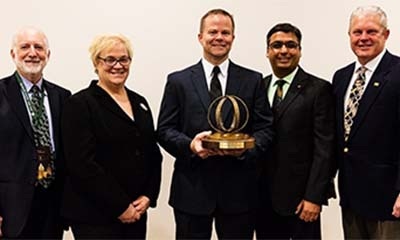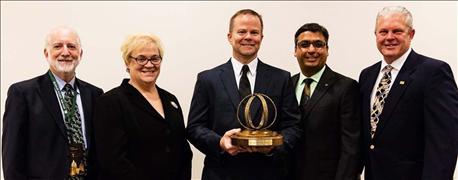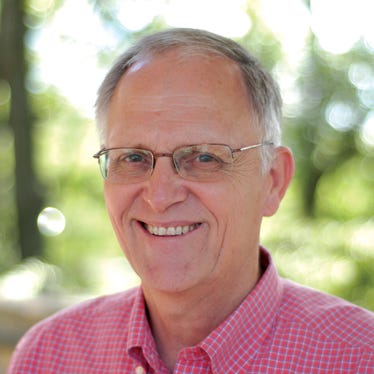October 13, 2016


> BIOTECHNOLOGY: Panelists at the Borlaug CAST Communication Award event (left to right) were: Neal Gutterson, Sally Rockey, Kevin Folta, Amit Dhinga and Todd Peterson.
At the 2016 World Food Prize symposium taking place in Des Moines, Iowa this week, there are a number of side events taking place. Yesterday, for the seventh year in a row, the winner of the Borlaug CAST Communication Award (BCCA) was honored. This year's recipient, Dr. Kevin Folta of the University of Florida, gave the keynote address titled Unveiling Our Halo--Building Trust with a Concerned Consumer.
As chairman of the Horticultural Sciences Department at the University of Florida's Institute of Food and Ag Sciences, Folta conducts research, educates students, and communicates important concepts about science and the public. With a wide following on social media, he participates actively in the public forum about a variety of topics related to ag biotechnology. He has received the National Science Foundation Career Award and other recognition for undergraduate mentoring.
Helping the public understand biotechnology as it relates to food
The Council of Agricultural Science and Technology is based in Ames, Iowa. Recipients of CAST's annual award are science/ag experts who demonstrate an ability to communicate through written material, public presentations, and various forms of media. Folta's blog (Illumination) covers recent events at the interface between society and science, and his weekly podcast (Talking Biotech) discusses genetic improvements in agriculture and medicine. He has designed a communication workshop that teaches scientists how to properly engage a skeptical public.
Says Jack Payne, vice president for ag and natural resources at the University of Florida, "Kevin Folta has done as much as anyone in the past decade to help the public understand the biotechnology behind its food." And many agree with Julie Borlaug Larson's observation: "He has not shied away from controversial subjects and has often been the number one target of the anti-science movement on behalf of all of us who support biotechnology."
After a breakfast sponsored by DuPont, the session began with short remarks by CAST Executive Vice President Kent Schescke and DuPont Pioneer's Vice President of Research and Development Neal Gutterson. Julie Borlaug Larson of the Norman E. Borlaug Institute for International Agriculture spoke about Folta's communication abilities. "My grandfather would choose Kevin for the award," she said. Then Crispin Taylor--executive director of the American Society of Plant Biologists--introduced the award recipient.
Challenges faced by scientists and the ag community
Folta's presentation centered on the challenges scientists and the ag community have when working with a concerned public. He thinks scientists must explain the evidence-based risks and benefits of agricultural biotechnology, and that can be tough to do in an age of misinformation. "Lead with your ethics--facts by themselves won't work," said Folta. "We need to listen, explain, and gain their trust by developing a shared understanding."
The honor is presented annually by CAST, and for the fourth year in a row, the award was sponsored by DuPont. Attendees included scientists, journalists, farmers from around the world, and dignitaries such as Iowa Secretary of Agriculture Bill Northey and the President of the World Food Prize, Ambassador Kenneth Quinn. Two previous BCCA winners also joined the gathering--2015 recipient Channapatna Prakash, Dean of the College of Arts and Sciences at Tuskegee University, and 2010 winner Akin Adesina, President of the African Development Bank.
Science and agriculture can help conquer “fears of the unknown”
Following Folta's speech, Sally Rockey--executive director, Foundation for Food and Agriculture Research--spoke about Feeding Innovation to Feed the World: Benefits of Public-Private Partnerships. Rockey focused on the boundless opportunities for scientific innovation and advancement that can be unlocked when the public and private sectors cooperate. "Ag is the place to be," said Rockey.
Todd Peterson-a business development expert with SUSTAIN, a Land O' Lakes company-used his expertise as the Chair of CAST's Ag Innovation Series to emphasize the importance of technology as he introduced the lead author for the series keynote paper, Technologies on the Shelf. Amit Dhingra-Associate Professor of Genomics and Biotechnology at Washington State University-spoke about The Need for Agricultural Innovation to Sustainably Feed the World by 2050: Technologies on the Shelf. Dhingra maintains that we have many useful biotech crops that are sitting on the shelf. He gave a preview of the forthcoming CAST paper that will examine known agricultural and food technologies that are underused or not used at all.
Folta and Gutterson then joined the panel discussion--a session moderated by Peterson that included expert insights and a Q&A with the audience. All seemed to agree that communication is the key, and those in the ag/science community need to actively and thoughtfully join the conversation.
The CAST website (www.cast-science.org) will soon feature a video of Folta's presentation and updated information about the award, including nomination forms for the 2017 Borlaug CAST Communication Award.
About the Author(s)
You May Also Like






